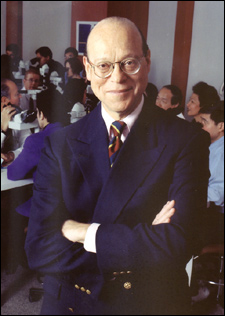Ackerman funds program for culture, medicine
A. Bernard Ackerman, a physician and professor who has devoted his career to finding inventive and engaging ways of teaching, is creating a new

endowment at Harvard for the study of culture and medicine. The A. Bernard Ackerman Endowment for the Culture of Medicine will establish a professorship and support a wide range of activities that encourage collaboration among the Faculty of Arts and Sciences (FAS), Harvard Medical School (HMS), and other departments throughout the University. The endowment will help Harvard educate students – both those who will become physicians and those who will someday be patients – about the interdisciplinary dimension of the physician-patient relationship.
After graduating from Princeton University and the College of Physicians and Surgeons of Columbia University, Ackerman came to Harvard for his third year of residency in dermatology and a fellowship in dermatopathology at the Massachusetts General Hospital. He went on to a career practicing and teaching dermatopathology; authored hundreds of articles and numerous books; and started two professional journals. In addition, he is the founding director of the Ackerman Academy of Dermatopathology in New York City, a center devoted to diagnosis, teaching, and advancing knowledge of skin diseases. He established the publishing company Arbor Scribendi in 1997 to produce medical books in an innovative and visually appealing way.
By setting up this endowment, Ackerman is calling on students and faculty to think about the dramatic changes currently unfolding in the practice of medicine, as well as the contrasting ways in which medicine has been viewed
The first annual Ackerman Symposium on Culture and Medicine kicks off the endowment’s activities on April 23 and 24 at Harvard Medical School.
historically. Exploring the culture of medicine will entail studying the historical evolution of health and disease, the social implications of new scientific discoveries, and the ethics of physician-patient relationships. It will also involve looking beyond the American health-care system to examine trends in health and medical care worldwide, and examining the ways in which artists and writers have depicted the practice of medicine and the experience of disease.
Ackerman said he was inspired by President Lawrence H. Summers’ ambitious vision for cross-School collaboration on a scale unmatched by any other university. “This topic cuts a wide swath through the entire University, with meaningful applications for every School,” Ackerman said. “In business, government, medicine, theology, art, and law – there is a place in the curriculum for these kinds of questions.”
In addition to the professorship, the gift will also support libraries, undergraduate research, graduate student activities, skills training, and an annual series of symposia. The first annual Ackerman Symposium on Culture and Medicine kicks off the endowment’s activities on April 23 and 24 at the Medical School.
This year’s symposium will focus on medical consumerism, exploring the changing nature of the physician-patient relationship. Critics say the traditional rapport between physician and patient is transforming into something akin to a business relationship, in which physicians are beginning to view their patients as clients. At the same time, patients are bombarded with more medical information than ever before on television and the Internet.
“If you turn on the TV, you see direct consumer ads for drugs – which is something that was prohibited by law and by ethics 25 years ago – and now it’s a part of our consumer culture,” said Allan M. Brandt, Kass Professor of the History of Medicine and director of the Division of Medical Ethics at Harvard Medical School, who is leading the symposium along with Marcia Angell, former editor in chief of the New England Journal of Medicine and senior lecturer in the Division of Medical Ethics at HMS. Brandt’s research and teaching (at both HMS and the FAS, where he chairs the Department of the History of Science) has centered attention on the broad social and cultural forces shaping patterns of health and disease, and the practice of medicine.
The past few decades have brought great advances in medicine and technology, but in Ackerman’s view, these advances have been accompanied by an erosion of the value system that places patient care first. Economic incentives have assumed tremendous importance, and legal obstacles are increasing. With malpractice lawsuits growing out of control, he said, physicians find themselves in a position in which they have to practice so-called defensive medicine, and it is up to universities to question whether these trends serve the best interests of patients.
Another key part of teaching the culture of medicine may be to re-examine the culture of the students who are doing the learning, according to Ackerman. Medical students tend to have a narrow focus that prohibits them from interacting with the rest of the University – indeed, at Harvard, they do most of their work miles away from the Cambridge campus. Ackerman wants to make the study of the culture of medicine part and parcel of an undergraduate pre-med education, while also immersing medical students in other parts of the University.
“Harvard is the ideal place for this kind of study, not only because of the strength of the Medical School but also because of the influence this great University wields, and the sheer concentration of expertise at all the Schools and departments. I feel tremendous exhilaration because people like President Summers and Allan Brandt share this vision,” Ackerman said. “Our objective here is not merely the revivification of medicine and the animation of certain aspects of universities, but to make a major contribution to society.”




